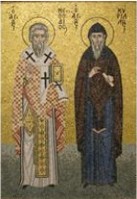
Cyril and Methodius: The history of the Slavs, both political and literary, can be started with “holy brothers of the Thessaloniki”
May 24 is the Day of Slavic Writing and Culture, traditionally timed to the Day of Remembrance of the Holy Equal-to-the-Apostles Cyril and Methodius - creators of the Old Slavonic alphabet, Christian preachers. Their lives are mentioned in the "Tale of Bygone Years by the Laurentian List" - the oldest chronicle of the Russian land, an electronic copy of which is represented on the portal of the Presidential Library.
The Presidential Library invites users to learn rare editions of the XIX century dedicated to the writers. Slavonic scholar Platon Kulakovsky equated their contribution to the development of Slavic culture to the feat. This is stated in the essay of 1885 "History of attempts to solve the question of a single literary language among the Slavs": "In the history of culture it is difficult to indicate equal to them giants whose educational activities would leave so great traces. Cyril and Methodius laid the foundation for the idea of the literary unity of the Slavic peoples, so divided among themselves in their further history".
They took on selfless work to create not only the Slavic alphabet, but also the introduction of the Old Slavonic language into church rituals, to which the Roman popes and cardinals gazed with unconcealed jealousy.
"Cyril and Methodius, appearing in Rome for the first time", written in “Cyril and Methodius, Slovene pioneers", the historical-critical study of Joseph Dobrovsky in 1825", concealed the divine service they introduced in Slovenian and, therefore, the invention of the Slovenian charter, so uncoordinated with the spirit of the Roman Court. This is an immutable truth, for we read in the bull of Pope John VIII, 879, which he calls Methodius from his archbishopric in Rome for the answer: "We hear, Papa is saying, that you sing the liturgy in barbarous, i.e., Slovene language". […] Methodius with prudent representations persuades his father to solemnly allow the use of Slovene language during worship".
After the Christianization of Rus’, the language created by the brothers, has become Slavic.
In the XIX century, European scholars are disagreed on the origin of Cyril and Methodius. According to the most common version, the brothers were considered Greeks. However, some authors insist on their Slavic origin. Most of all, the well-known Russian scientist and journalist Mikhail Pogodin finds this. He devoted a whole study to this question. His book "St. Cyril and Methodius - Slavs, not Greeks", published in Moscow in 1864, leads the reader to the conclusion that the holy brothers were Slavs, although there is no indisputable evidence: "There is no direct, positive evidence in the first sources - both in favor of Greek, and in favor of Slavic origin: we must find it through considerations and guidance".
Experienced journalist scrupulously examines the topic and argues for the argument in favor of the fact that the brothers were Slavs: "Thessaloniki is a Greek city, but in St. Cyril’s time it was inhabited by the Slavs in equal, or even more so, like the Greeks, and the district side was then and until now a purely Slavic side".
Further, he asks a no less logical question: "The Greeks considered their language to be a model of perfection, - just as the Romans thought about their language. All the other peoples in their eyes were barbarians, and to become people, they had to master their languages, Greek and Roman. Do we see many Greeks and Romans as translators into some foreign barbarian language?"
In the very life of St. Cyril and Methodius, the author further argues, we do not see the Greek signs: "In the tale of St. Cyril-philosopher in synodal prologue (№24) of the XIII or XIV century, among other things, it is said that St. Cyril, taken to the imperial palace for education "learned four languages and philosophies: Hellenic, Roman, Sears, Jews". The question is - if the Hellenic language was a natural St. Cyril, then why would he study it, and why would not the Slavic language be mentioned here? It is clear that the Slavonic language was natural to St. Cyril".
But this was not enough for the author of this linguistic investigation. "And here's another proof from the opposite", Pogodin draws a line to his research. - If Cyril and Methodius were Greeks, it would be impossible to explain about them the silence of the Greek writers who begin to talk about them, and a few, very late, and very superficially…".
The contribution of Cyril and Methodius to the culture of the Slavs is great, and it for many centuries determined the direction of its development. "Since the activity of the holy brothers of the Thessaloniki", writes Platon Kulakovsky, - "one can begin the history of the Slavs, both political and literary".

